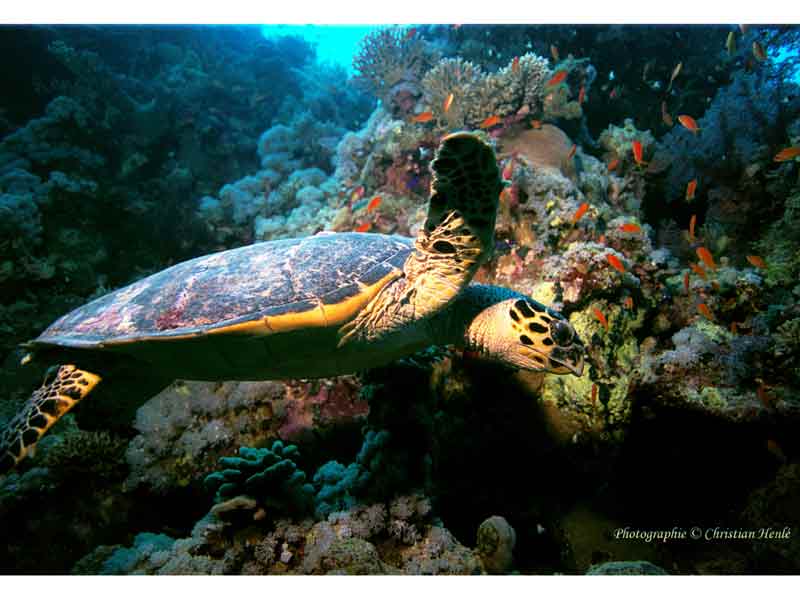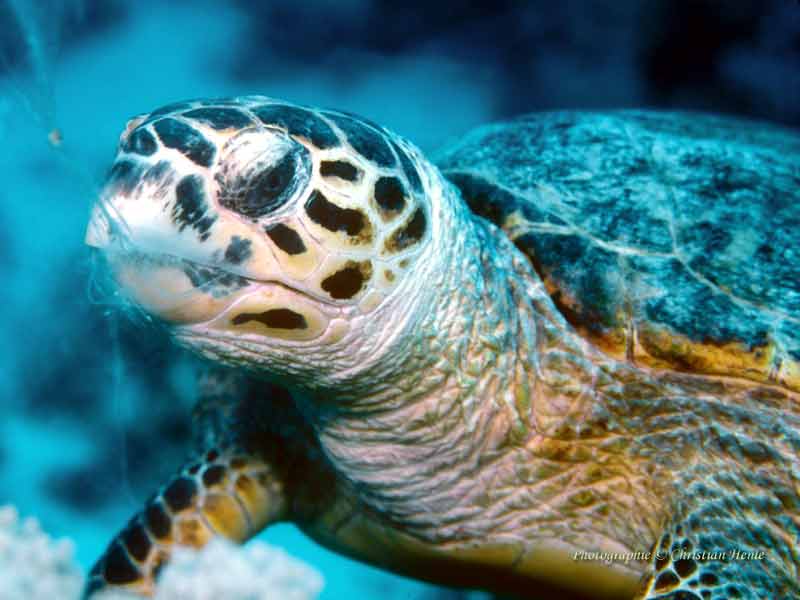Hawksbill turtle (Eretmochelys imbricata)
Distribution data supplied by the Ocean Biodiversity Information System (OBIS). To interrogate UK data visit the NBN Atlas.Map Help
| Researched by | Rebecca Harris | Refereed by | Admin |
| Authority | (Linnaeus, 1766) | ||
| Other common names | - | Synonyms | - |
Summary
Description
Recorded distribution in Britain and Ireland
With such few recordings, this species could be considered a vagrant in UK waters.Global distribution
-Habitat
Hawksbills use different habitats at different stages of their life cycle. Adults are usually not found in shallow marine habitats (unless coming ashore to nest), whereas small juveniles are rarely far from the shallowest coral reefs in tropical waters and therefore unlikely to be found in the British Isles.Depth range
-Identifying features
- Up to a 1 m in length and weigh up to 80 kg.
- Carapace is amber streaked with reddish-brown, blackish-brown and yellow markings.
- Mouth is beak-shaped.
Additional information
Populations of hawksbill are threatened with decline as a result of a number of factors, including loss of nesting sites, accidental entanglement in fishing line and the destruction of coral reefs which provide a feeding ground.Listed by
Bibliography
Anonymous, 1999ii. Marine turtles. Grouped Species Action Plan http://www.ukbap.org.uk/UKPlans.aspx?ID=335, 2001-07-09
Brongersma, L.D., 1972. European Atlantic Turtles. Leiden. Zoologische Verhandlingen.
Costello, M.J., Bouchet, P., Boxshall, G., Emblow, C. & Vanden Berghe, E., 2004. European Register of Marine Species [On-line]. http://www.marbef.org/data/erms.php,
National Research Council, 1990. Decline in Sea Turtles: Causes and Prevention. Washington, D.C: National Academy Press.
Penhallurick, R.D., 1990. Turtles off Cornwall, the Isles of Scilly and Devonshire. Truro: Dyllansow Pengwella.
Red List Standards & Petitions Subcommittee, 1996. Eretmochelys imbricata. In: IUCN 2006. www.iucnredlist.org,
US Fisheries & Wildlife Service, 2005. Hawksbill Sea Turtle (Eretmochelys imbricata). [On-line]. http://www.fws.gov,
Datasets
Marine Environmental Monitoring, 2018. Marine Turtles. Occurrence dataset: https://doi.org/10.15468/xy69ku accessed via GBIF.org on 2018-10-01.
NBN (National Biodiversity Network) Atlas. Available from: https://www.nbnatlas.org.
OBIS (Ocean Biodiversity Information System), 2025. Global map of species distribution using gridded data. Available from: Ocean Biogeographic Information System. www.iobis.org. Accessed: 2025-08-02
Rotherham Biological Records Centre, 2017. Rotherham Biological Records Centre - Non-sensitive Records from all taxonomic groups. Occurrence dataset: https://doi.org/10.15468/d3tufo accessed via GBIF.org on 2018-10-02.
Citation
This review can be cited as:
Last Updated: 03/09/2007




